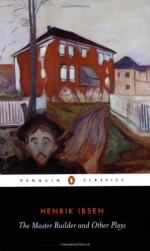|
This section contains 1,464 words (approx. 4 pages at 400 words per page) |

|
Perkins is an instructor of twentieth-century literature and film. In this essay, Perkins examines Ibsen's adaptation of the Faust myth in Ibsen's play.
The story of a man who sells his soul to the devil so that he can gain knowledge, power, and riches can be traced back to the beginning of Christianity. This tale has been told under various names until the Renaissance, when it became known as the Faust myth. A German history of Dr. Faustus, the first known written account of the legend, inspired Christopher Marlowe's celebrated version, Dr. Faustus (1604). Since Marlowe's play, the story has appeared in various forms including Goethe's Faust (1808). In The Master Builder, Ibsen creates his own version of the myth as he weaves it into the thematic fabric of his play. Through the tragic Faustian tale of architect Halvard Solness, Ibsen explores the nature and devastating consequences of unchecked...
|
This section contains 1,464 words (approx. 4 pages at 400 words per page) |

|




